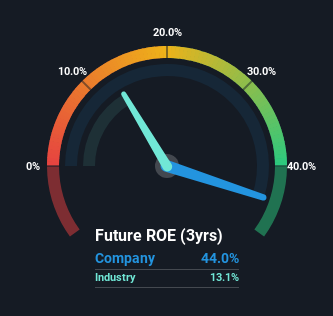One of the best investments we can make is in our own knowledge and skill set. With that in mind, this article will work through how we can use Return On Equity (ROE) to better understand a business. By way of learning-by-doing, we’ll look at ROE to gain a better understanding of Live Nation Entertainment, Inc. (NYSE:LYV).
ROE or return on equity is a useful tool to assess how effectively a company can generate returns on the investment it received from its shareholders. Put another way, it reveals the company’s success at turning shareholder investments into profits.
See our latest analysis for Live Nation Entertainment
How Do You Calculate Return On Equity?
The formula for ROE is:
Return on Equity = Net Profit (from continuing operations) ÷ Shareholders’ Equity
So, based on the above formula, the ROE for Live Nation Entertainment is:
44% = US$749m ÷ US$1.7b (Based on the trailing twelve months to September 2023).
The ‘return’ is the yearly profit. So, this means that for every $1 of its shareholder’s investments, the company generates a profit of $0.44.
Does Live Nation Entertainment Have A Good Return On Equity?
Arguably the easiest way to assess company’s ROE is to compare it with the average in its industry. The limitation of this approach is that some companies are quite different from others, even within the same industry classification. As is clear from the image below, Live Nation Entertainment has a better ROE than the average (13%) in the Entertainment industry.
That is a good sign. However, bear in mind that a high ROE doesn’t necessarily indicate efficient profit generation. A higher proportion of debt in a company’s capital structure may also result in a high ROE, where the high debt levels could be a huge risk .
How Does Debt Impact ROE?
Companies usually need to invest money to grow their profits. That cash can come from retained earnings, issuing new shares (equity), or debt. In the first and second cases, the ROE will reflect this use of cash for investment in the business. In the latter case, the use of debt will improve the returns, but will not change the equity. Thus the use of debt can improve ROE, albeit along with extra risk in the case of stormy weather, metaphorically speaking.
Combining Live Nation Entertainment’s Debt And Its 44% Return On Equity
We think Live Nation Entertainment uses a significant amount of debt to maximize its returns, as it has a significantly higher debt to equity ratio of 3.88. While its ROE is no doubt quite impressive, it could give a false impression about the company’s returns given that its huge debt could be boosting those returns.
Conclusion
Return on equity is one way we can compare its business quality of different companies. Companies that can achieve high returns on equity without too much debt are generally of good quality. If two companies have the same ROE, then I would generally prefer the one with less debt.
But ROE is just one piece of a bigger puzzle, since high quality businesses often trade on high multiples of earnings. The rate at which profits are likely to grow, relative to the expectations of profit growth reflected in the current price, must be considered, too. So you might want to take a peek at this data-rich interactive graph of forecasts for the company.
If you would prefer check out another company — one with potentially superior financials — then do not miss this free list of interesting companies, that have HIGH return on equity and low debt.
What are the risks and opportunities for Live Nation Entertainment?
Live Nation Entertainment, Inc. operates as a live entertainment company.
View Full Analysis
Rewards
-
Trading at 40.5% below our estimate of its fair value
-
Earnings are forecast to grow 27.54% per year
-
Earnings grew by 83.2% over the past year
Risks
No risks detected for LYV from our risks checks.
View all Risks and Rewards
Have feedback on this article? Concerned about the content? Get in touch with us directly. Alternatively, email editorial-team (at) simplywallst.com.
This article by Simply Wall St is general in nature. We provide commentary based on historical data and analyst forecasts only using an unbiased methodology and our articles are not intended to be financial advice. It does not constitute a recommendation to buy or sell any stock, and does not take account of your objectives, or your financial situation. We aim to bring you long-term focused analysis driven by fundamental data. Note that our analysis may not factor in the latest price-sensitive company announcements or qualitative material. Simply Wall St has no position in any stocks mentioned.
